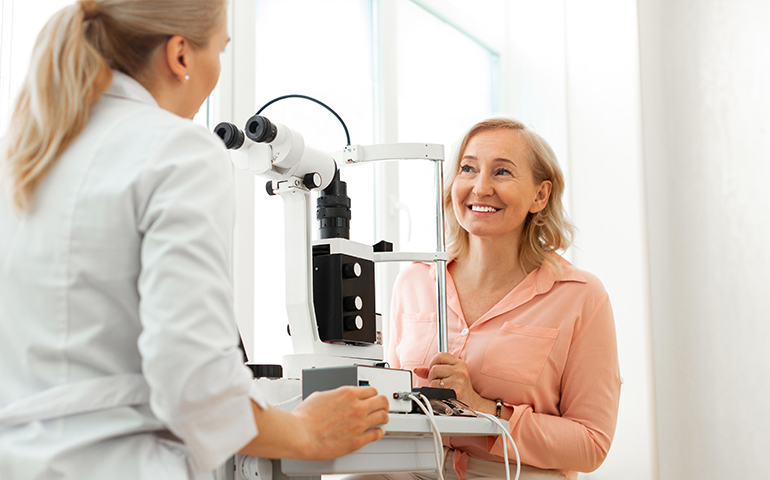
What are the different eye care professionals?
The three different eye care practitioners most referred to are the optician, optometrist and ophthalmologist. In addition to these, there are also ophthalmic registered nurses with special training to care for eyes, ophthalmic medical assistants, ophthalmic technicians and contact lens opticians. These typically work in hospitals alongside ophthalmologists.
The two main eye care providers are optometrists and ophthalmologists.

Who provides eye care equipment?
The person you encounter when you buy corrective glasses, sunglasses or contact lenses on the high street is usually the dispensing optician or optical assistant who has been trained to do so.
Dispensing optician
The dispensing optician is not qualified to perform eye tests or write prescriptions, but they have specialised training and are qualified to read your prescription and fit and dispense glasses or contact lenses to these specifications. Dispensing opticians are required for restricted categories, for example, customers under 16 or those with complex prescriptions.
After registration, the optician is trained to give clinical advice about corrective glasses and contact lenses and how to wear and care for them. Therefore, they are typically the final step of your eye test.
Qualifications
Except for a few specialists, dispensing opticians will not examine your eyes or treat eye conditions. All dispensing opticians in the UK have a diploma qualification from the Fellowship of British Dispensing Opticians (FBDO); however, they are not medical doctors.
Education
The requirements for applying for a college course or apprenticeship for a fellowship dispensing diploma is graduating from secondary school with at least 5 GCSE grades between 9 and 4, or 1 or 2 A-levels.
The training typically stretches over three years, with substantial time spent working under supervision, which can differ for each program. To complete the course, the trainees need to pass the examinations from the Association of British Dispensing Opticians (ABDO).
Career opportunities
After qualification, dispensing opticians are certified to advise on frames for corrective glasses and contact lenses that suit the customer’s prescription and lifestyle.
Registered dispensing opticians also have the chance to undergo further training, for instance, to become contact lens opticians and offer fittings and contact lens aftercare, or they can specialise in business management if they aim to eventually manage their optical practice.
Salary expectations
The average annual starting salary of a dispensing optician in the UK is £22000, increasing with experience up to an annual salary of £38000.
Who does your eye test?
When your vision changes, you experience issues with your eyes, such as irritation or headaches, or just need a routine eye exam, you will likely arrange an appointment with your local optometrist. The optometrist typically works in an optician’s practice alongside dispensing opticians.
Optometrist
An optometrist sometimes referred to as an ophthalmic optician, is a specialised eye health care professional who is licensed to practise optometry.
This means they can examine your eyes for refractive errors and write prescriptions for corrective glasses or contact lenses. They are also qualified to detect, treat and manage vision changes or eye conditions, but most Optometrists are not licensed to prescribe medication.
When an optometrist detects a specific condition, they may refer you via the GP to see an ophthalmologist or neurologist.

Qualifications
In the UK, every working optometrist is required to be registered with the General Optical Council (GOC). To join the register, every aspiring optometrist needs to gain the following education:
Education
Optometrists acquire their medical knowledge through attending and completing a BSc (Hons) degree in optometry. After graduation, they spend one year in a supervised work placement, working alongside a registered optometrist. Following the completion of this, they will need to pass the final Scheme for Registration before qualifying as registered optometrists.
Registered optometrists are qualified to detect not only eye conditions but also other health conditions that are expressed through abnormalities in the eyes, such as high blood pressure, diabetes, autoimmune diseases or even certain types of cancer. However, in the UK, optometrists are not medical doctors.
Career opportunities
Optometrists have the option to work in optician’s practices, alongside dispensing opticians to examine the eye health of patients, or in hospitals alongside a team of eye specialists. Working in an NHS hospital will give optometrists the chance to work their way up from specialist and Principal optometrist to Consultant optometrist.
If they choose to continue to doctorate studies and graduate with a PhD, they also have the choice to work in research, at a hospital or in a lab.
Salary expectations
The expected annual salary for newly registered optometrists in the UK starts at £31,000 and can increase to an annual salary of up to £87,000 for consultant optometrists. Optometrists can also choose to start their own business, which can increase their salary to over £100,000 per year.
How optometrists help their patients
You have most likely encountered an optometrist every time you had an eye test or required a new prescription for your glasses or contact lenses. As your primary healthcare source for eye health, there are many ways in which optometrists help their patients.
Where do optometrists work?
Many optometrists may choose to work in research or other sectors that are not in direct contact with patients. However, those who examine your eyes work primarily in one of three different environments:
Community optometrist
Community optometrists work in optician’s practices on the high street. They examine patients’ eyes for vision changes and other conditions, write prescriptions for corrective tools, such as glasses and contact lenses and offer advice on eye exercises and eye care. They provide clinical, professional and personal patient care.
Hospital optometrist
Hospital optometrists work, as the name might reveal, in the hospital. They typically work alongside ophthalmologists within a team of eye specialists. Hospital optometrists attend to patients with urgent needs; they are also commonly specialised in certain conditions, such as glaucoma, cataracts or age-related macular degeneration, and assist further in these areas.
Domiciliary optometrist
Domiciliary optometrists are there for patients who are unable to attend an appointment at the optician’s practice or hospital. They visit private homes, care homes, and community or daycare centres. Domiciliary optometrists will be specialised in examining and communicating with patients who have disabilities or dementia.
What are the responsibilities of an optometrist?
Optometrists examine the internal as well as the external structure of your eye to detect various eye conditions and diseases. They can test how well your eyes can focus and perceive depth or colour, as well as advise you on how to manage conditions such as astigmatism, cataracts or dry eyes.
What can an optometrist diagnose?
As well as a large variety of eye conditions, optometrists will also be able to diagnose other common health conditions that are expressed through changes in your eye health. These conditions include high blood pressure, diabetes, autoimmune diseases and high cholesterol.
What can an optometrist treat?
Optometrists are qualified to treat all common eye conditions, as well as refractive errors.
Who treats eye conditions and performs the surgery?
The most common and routine eye surgeries are cataract surgery, which has the highest success rate of ocular surgeries, and laser eye surgery to correct refractive errors, such as myopia and astigmatism. If you have any of these procedures, the surgeon that assesses your eyes and performs the cautious surgery is the ophthalmologist.
They are also the person that manages chronic eye conditions and prescribes medication for eye conditions.
Ophthalmologist
An ophthalmologist is a physician specialising in the structure, function and diseases of the human eyes. They work in medicine as well as surgery, treating patients of all ages in outpatient clinics and community clinics. They diagnose and manage ophthalmic conditions and serious diseases that require intense monitoring.
Qualifications
In the UK, ophthalmologists are medical doctors who complete extended training to qualify for and treat a diverse range of conditions.
Education
After completing medical school, aspiring ophthalmologists spend two years of medical training called the MSC Foundation Programme, during which they will register with the General Medical Council (GMC). Following this are seven years of ophthalmic specialist training (OST), during which the students pass several examinations by the Royal College of Ophthalmologists.
During this training, they will gain experience working with patients in different departments, typically including ophthalmology.
Career opportunities
Most Ophthalmologists will aspire to become consultants, which allows them to take on more responsibilities and clinical duties. However, the competition for consultant roles is strong, therefore, some may consider working as speciality doctors instead, allowing the ophthalmologists to explore their primary interests. Those with a research interest may take a higher degree during training and choose to become academic ophthalmologists.
Different branches and careers of ophthalmology offer a varying range of annual salaries, starting from £30,000 during training and rising with experience up to exceeding an annual salary of £100,000.
MD
Ophthalmologists registered in the UK are medical doctors licensed to practice medicine, as well as perform certain surgeries. While Consultant Ophthalmologists will also get involved in research and train junior doctors, they work with a specialised team examining and assessing patients to diagnose accurate treatment.
They treat patients with urgent emergencies, such as eye injuries or infectious eye diseases. They also manage long-term illnesses, as with chronic eye diseases such as diabetic retinopathy.
Ophthalmologists perform surgery including laser. Cataract surgery is the most performed routine ocular surgery and has a high success rate. They also carry out corneal transplants, oculoplastic surgery around the eye or orbital surgery on the eye socket.
Subspecialists
Subspecialist ophthalmologists go through additional training after finishing their initial examinations with the Royal College of Ophthalmologists. This allows them to focus on specific eye care requirements, which can be for conditions such as glaucoma or children’s eye with paediatric ophthalmology.
How ophthalmologists help their patients
Ophthalmologists help their patients on various accounts by identifying eye problems, diagnosing and treating eye diseases by prescribing medication and performing eye surgery when necessary.
Where do ophthalmologists work?
Most commonly, ophthalmologists work in outpatient clinics or community clinics. In hospitals, they work with doctors, ophthalmic nurses, orthoptists and optometrists and consult ocular prosthetists to offer their patients thorough eye care.
Which conditions can an ophthalmologist detect?
While ophthalmologists diagnose most eye conditions, they are also trained to detect other body issues that affect the eyes, such as certain cancers, thyroid disease, high cholesterol and multiple sclerosis.
Do ophthalmologists perform surgery?
Yes, once fully trained and registered, ophthalmologists are licensed to perform certain surgeries around and in the eyes.
Choosing the right eye care professional
Protecting your vision is important, so it is beneficial to know when to choose the right eye professional to help you.
Issues with glasses or contact lenses
If you have issues adapting to a new pair of glasses, you can contact your optician to adjust your glasses frame.
Feeling like your new contact lenses don’t sit right, move around or cause blurred vision, your optometrist or contact lens optician can assess this.
Discomfort or irritation lasting longer than 24 hours
Should you ever experience pain or feel like your eyes are watering excessively due to irritation, an eye exam by an optometrist can detect any risks and diseases as early as possible. If the optometrist notices any irregularities, they may refer you to the GP or ophthalmologist to treat the condition accordingly and with expertise.